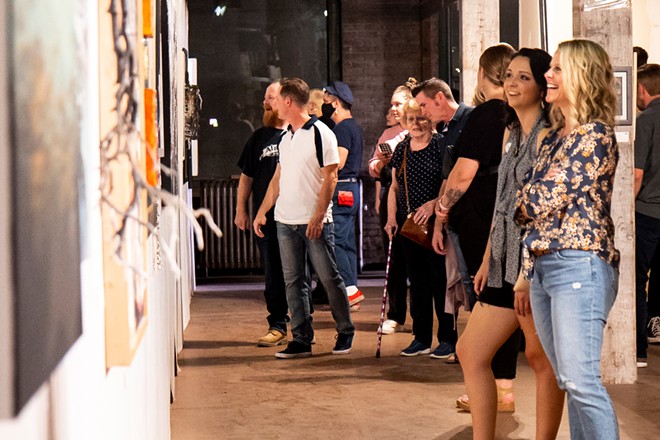Year after year, the Spokane community turns out at annual art events. But when the art community was hit hard by COVID, the outlook was bleak. Local arts organizations still continue to work overtime in an attempt to get their heads above water.
Help is on the way. ArtsFund, a statewide arts advocacy and grant-making organization based in Seattle, recently received a private infusion of $10 million from the Paul G. Allen Family Foundation. The contribution will fund its new Community Accelerator Grant program, which aims to help arts organizations invest in their missions. The grants will go to organizations around the state and will range in amounts from $2,500 to $25,000.
This program is open to Washington-based arts and cultural organizations with a three-year average budget of $25,000 or greater that have primary missions to produce or support arts and cultural activities. Eligibility includes organizations with their own nonprofit status, fiscally sponsored organizations and tribal organizations.
Michael Greer, president and CEO of ArtsFund, says the goal while creating the program was to remove any barriers involved with receiving grants, and include a diverse set of people and organizations in the process.
"This is aimed to be a statewide distribution that is really intended to capture as much geographically and demographically of the state as possible," Greer says. "That is reflected in our advisory panel. We wanted to create a panel that was reflective of the state of Washington as a whole."
Choosing who sat on the Community Advisory Panel was "extremely intentional," Greer says. The panel's 12 members are all involved in Washington's art scene or philanthropy and "reflect a wide array of lived experiences, including Black, Indigenous, and people of color, LGBTQ+ and people with disabilities," Greer explains.
The panel includes two local names: Shelly Wynecoop, who administers grants for the Spokane Arts Grant Awards, and Ginger Ewing, Terrain's executive director.
Both Wynecoop and Ewing have been deeply involved in Spokane's art community, getting their hands dirty during the thick of the pandemic by applying for grants and doling out funds to struggling artists.
Wynecoop's role at SAGA has allowed her to see firsthand some semblance of a recovery.
"Many organizations have begun to do what I call a needs assessment," she says. "They're starting to reach out for that support as the shock of the damage from the pandemic wears off. I'm beginning to talk to people and guide them through the recovery process. This program came at a perfect time."
One unique specification of these grants is that they're unrestricted, meaning applicants don't have to specify exactly what the funds are being used for, just that they're going into the organization in some way.
Funded by the Paul G. Allen Family Foundation, the Community Accelerator Grant program will provide unrestricted grants for cultural nonprofit organizations across Washington state in amounts between $2,500 and $25,000.
WHO CAN APPLY?
Washington state-based arts and cultural organizations with a three-year average budget of $25,000 or greater. This also includes organizations with their own 501(c)(3) status, fiscally sponsored organizations and tribal organizations.
WHEN WILL APPLICATIONS OPEN?
January 2023 with award distribution expected in the first quarter of 2023. Learn more about the Community Accelerator Grant at artsfund.org/accelerator and at ArtsFund's grant information session on Dec. 9 at 11 am.
"That's something you don't see often in the arts sector," Ewing says. "Unrestricted grants are, in many ways, a gift. That tells us that the program understands that the organizations know what's best for them and how to spend their money in the most impactful way possible."
As members of the advisory panel, Wynecoop and Ewing are expected to speak up if something doesn't seem equitable or if they have any advice for the ArtsFund team on how the program could run more smoothly. They'll act as advisers for key aspects of the program, including community outreach, application materials, eligibility, the scoring process and the final distribution of the awards.
"I'm really wanting to advocate for the smaller arts organizations," Wynecoop says. "It's so hard to be heard and receive necessary funding when you're not one of those bigger voices. An award of $25,000 will go a lot further somewhere like Spokane than it would in the Puget Sound area. They're not equal, and that's what ArtsFund is trying to rectify with this program."
Ewing has similar hopes for the grants. As the director of Terrain, Spokane's arts nonprofit, she's seen just how much significant funding can change the outcome of an organization's efforts.
"The arts are still struggling with the repercussions of the pandemic," Ewing says. "Yes, we're having events again, we're gathering but we have two and a half years of lost revenue to make up for. That doesn't come easily for smaller organizations."
Though the arts are beginning to stir awake and reach out for much needed support, the work doesn't end with this specific program.
"It's going to take several years to recover," says Wynecoop. "So I can only hope that this significant private investment will lead as an example for others. We hope that they will recognize that we are finding and using those investments and give more support in the future." ♦


